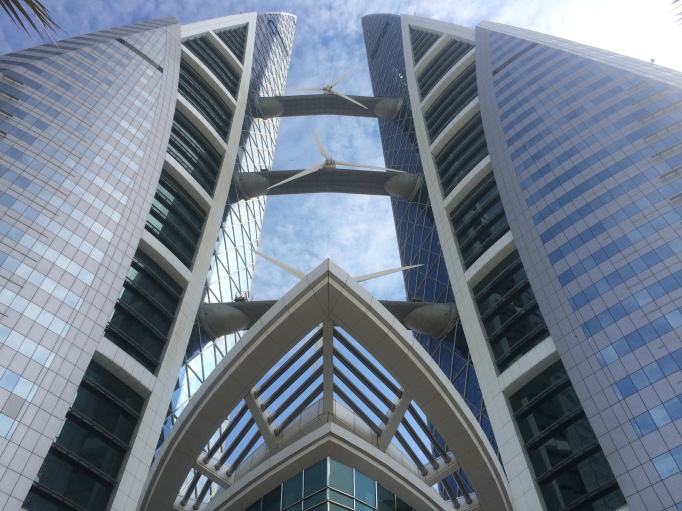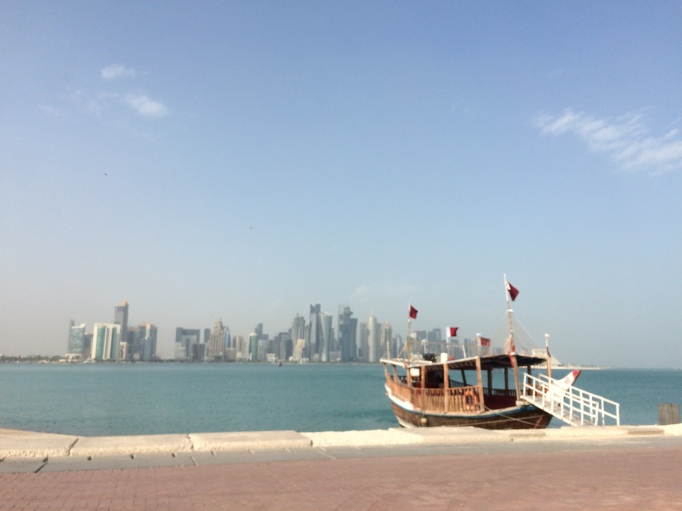If anyone wants to talk about a hidden jewel of the middle east, let’s talk about Oman. I used to associate Oman and Yemen as more similar than anywhere in the gulf, but they couldn’t be further away from one another in everything but geography. And I never expected Oman to be so different from the other GCC countries, but it’s literally a world apart (and a lot more beautiful!).
To begin with, there aren’t any shiny highrises or world trade centers, megamalls or shiny apartment compounds. It’s a city of small, traditional buildings, nestled between mountain valleys, with lively souks and humble businesses. The Sultan or ruling government put a legal limit on the height of buildings, specifically to avoid becoming another Dubai, and the houses that are built can only be a pale shade of 6 or 7 colours – bluish grey, beige to yellow, pastel green, purply-pink, sandy browns or plain white.
It’s still a very western, developed place, but nothing can take away from the feeling of finally being somewhere Arabic and exotic. The flat, dust plains have been replaced by rocky hills, red mountains and canyons wider and deeper than I could scale with my naked eye. Oases of date palms and little villages are always paired, and they appear and disappear after traversing a few hillsides in every direction out of Muscat. The government brings water and electricity to even the most remote villages, and if it’s not feasible, they build them an entire new village for them in a better location. I heard that many accept this offer (its totally free!), but continue living in their mountain top villages, and turn their new gated homes into goat stables, weekend retreats or just rent them out.
A lot of the places and people retain age old traditions, despite having the newest cars or iphones. In the souks they sell their goats and camels, keep them for farming, breeding or racing, and in the city they meet with foreign friends for a Lebanese meal or Starbucks coffee. Omani Coffee and dates are offered everywhere, from the souks and shops to hotels and restaurants. The beaches are vast and clean, scattered between cliffs that go straight into the sea, and fishermen take their boats out every evening to fish. They refuel their boats and trucks at cheap gas stations, where they can always answer a call to prayer since mosques are built at every one.
Even the fashion is different in Oman, the women more colourful and the men in sparkly kuma (hats). The men’s robes have little tassels hanging off-centered from their collar, said to be for oud (roll on perfume). Omanis were very superstitious with numbers, and are known to pay more for their license plates than for their cars. For example, a single digit number (1 or 5) or balanced double digits (12 or 44) are a sign of wealth, compared to the guy with the randomly assigned license plate number 27349.
Without giving away too many secrets of this place (I kind of like that its off the beaten track), make sure you visit some sink holes or Wadi’s around Muscat (ie. Wadi Shab and Wadi ibni Khalid), which are filled with pools of water to float down or cliff jump into. There’s a big stretch of nothing (affectionately called the Empty Quarter) nearby where you can drive your car thru sand for days. Barbeque some mishkaki (meat on a stick) with some locals, either at a picture perfect beach or at the top of a mountain overlooking the city nightscape. The latter I did for the eve of my birthday, where I was serenaded Happy Birthday by 12 couchsurfers, with a cake and candles and the whole 9 yards, while watching planes take off from the international airport. A few hours later I boarded my own plane for Africa, blissfully happy from my time in Oman but bitterly miserable for having to leave.

















